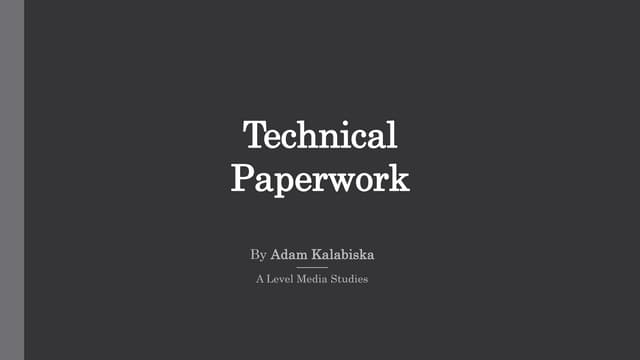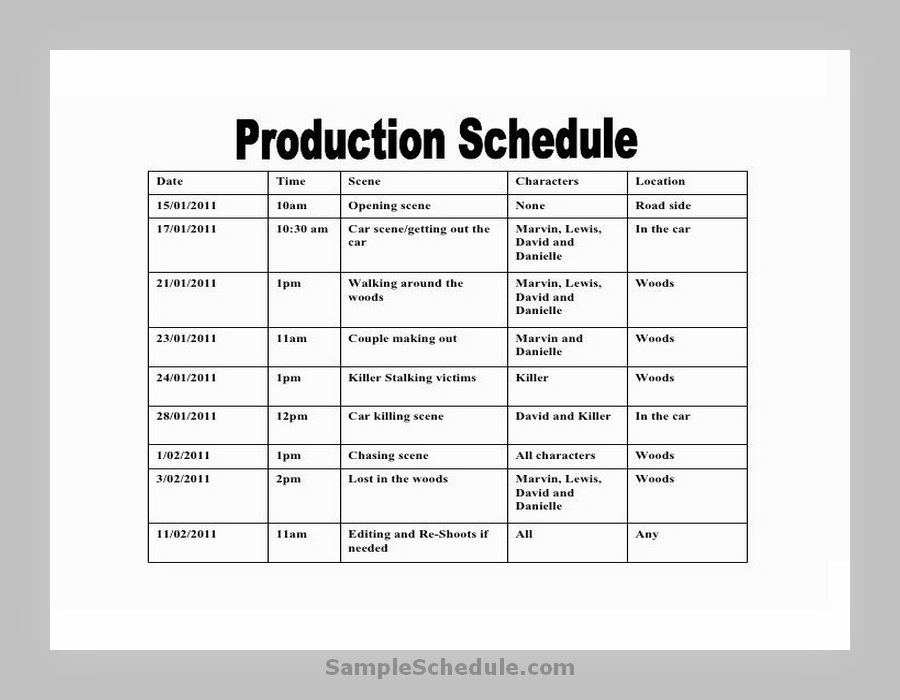5 Essential Documents for Producing a Short Film

In the dynamic world of filmmaking, especially when it comes to short films, the importance of meticulous documentation cannot be overstated. This article delves into the 5 essential documents you'll need when producing a short film. Understanding and preparing these documents can streamline your production process, ensure legal compliance, and keep your project on track from pre-production to post.
The Script

Every film begins with a story, and at the heart of that story is the script. The script serves as the blueprint for your film:
- Detailed Storyline: It outlines scenes, dialogues, and character actions.
- Scene Breakdown: It helps in planning and budgeting by breaking down the scenes into manageable segments.
- Visual Guide: A well-written script can act as a guide for the director of photography, set designers, and other crew members to visualize the film.
📝 Note: Always get a second or third opinion on your script to refine it further. Multiple revisions might be necessary before finalizing the shooting script.
Call Sheets

Call sheets are indispensable for coordinating the logistics of your shoot:
- Schedule: They detail the day's shooting schedule, including times for call, lunch, wrap, etc.
- Cast and Crew Information: Lists who is needed on set, their contact information, and their roles.
- Scene Details: Specifies which scenes will be shot, helping actors and crew prepare accordingly.
- Safety Protocols: Includes emergency contacts and procedures.
Production Budget

A detailed production budget ensures that you are financially prepared for the journey:
- Pre-production Costs: Includes script writing, casting, location scouting.
- Production Costs: Covers cast payments, crew, equipment, catering, transport, and insurance.
- Post-production Costs: Editing, special effects, sound design, and color correction.
- Contingency Fund: Always allocate 10-20% for unexpected expenses.
Here's an example of how you might break down your budget:
| Category | Estimated Cost |
|---|---|
| Pre-Production | $3,000 |
| Production | $15,000 |
| Post-Production | $8,000 |
| Contingency Fund | $2,600 |
| Total | $28,600 |

Permission Releases

Before any filming can commence, especially on public or private property, you'll need to secure permissions:
- Location Releases: Ensure you have written consent to film at specific locations.
- Talent Releases: Every person appearing in your film should sign a release form giving consent for their image or likeness to be used.
- Music Releases: If using copyrighted music, obtain the necessary rights or consider royalty-free options.
⚠️ Note: Permissions are crucial for avoiding legal hassles post-production. Always document permissions in writing.
Storyboards

Storyboards act as a visual guide to your film:
- Visual Planning: Illustrates camera angles, movements, and scene setups.
- Communication Tool: Helps convey your vision to the cinematographer, actors, and set designers.
- Time Saver: Reduces time spent on set deciding how to shoot a scene.
🎨 Note: Even if you're not artistically inclined, stick figures can work. The focus should be on communicating the shot composition and flow of the film.
Now that we've outlined the essential documents, here's what you need to consider:
- Stay Organized: Each document plays a critical role in managing the film's production process.
- Be Thorough: Completing these documents comprehensively will help avoid common pitfalls in filmmaking.
- Seek Assistance: Don't hesitate to consult with professionals or use resources available online to ensure your documents are accurate and legal.
In the production of a short film, these documents are not just about administrative duties; they are integral to making your vision a reality, ensuring a smooth production, and protecting your project legally. With these in place, you're not just making a film; you're ensuring its success from the very foundation. Whether you're an aspiring filmmaker or a seasoned pro, keeping these documents in order will set the stage for a well-executed project.
Why is a script necessary?

+
A script is vital as it serves as the foundation of your film, outlining the plot, dialogue, and character arcs which everyone involved in the film’s production will follow.
How detailed should a production budget be?

+
Your production budget should be as detailed as possible, accounting for every conceivable expense to avoid financial surprises. Include a contingency for unforeseen costs.
What are the consequences of filming without releases?

+
Filming without the necessary releases can lead to legal complications, including lawsuits for invasion of privacy or copyright infringement. Always secure written permissions.
Can storyboards be done digitally?

+
Absolutely, digital storyboards are common and can be shared easily with the crew. There are various software tools available to help you storyboard effectively.